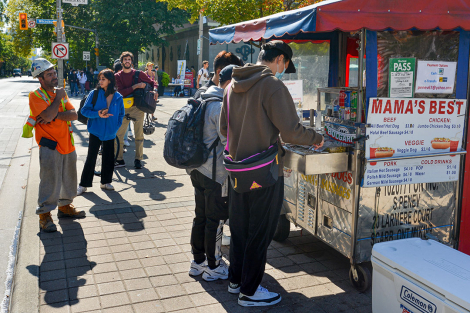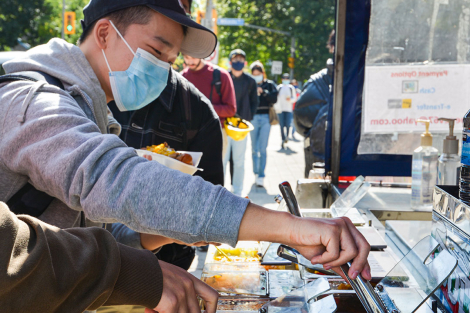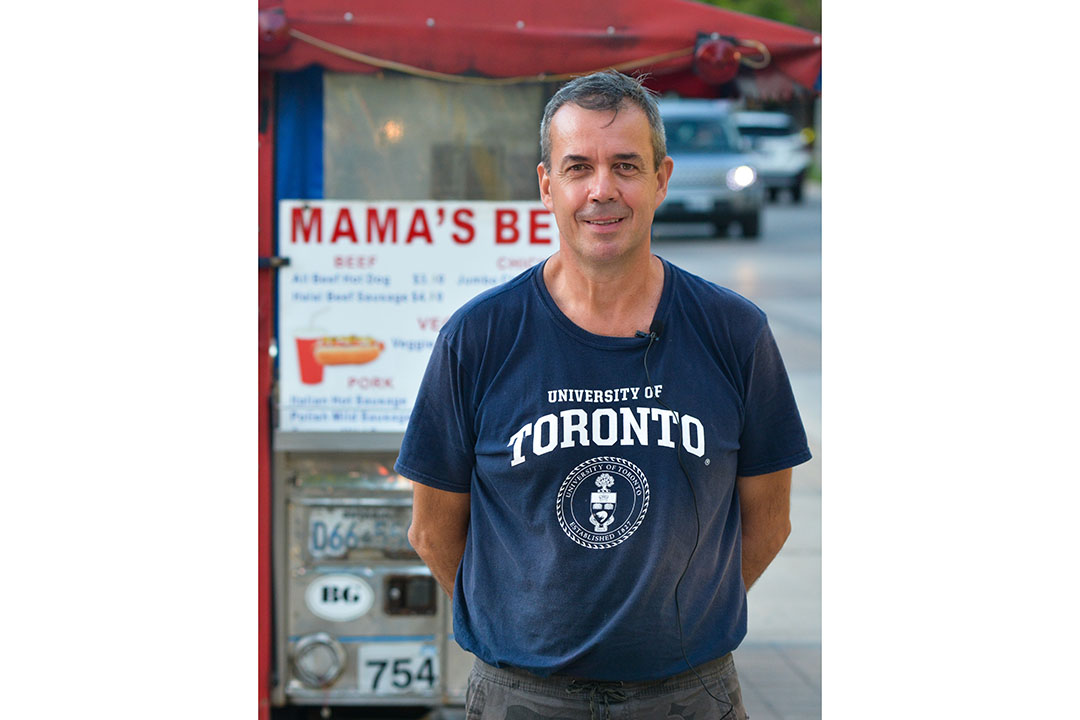Every morning, Stefan Penev begins to set up his hot dog stand, Mama’s Best. He wheels the trailer onto the sidewalk, clips menus onto its canvas walls, and starts to prepare the food for the day: the hot dogs, the buns, and the toppings.
It’s a modest space that Penev has built himself on the corner of St. George and Willcocks Street, but his hot dog stand is the culmination of decades of hard work and unflinching determination. Mama’s Best is a testament to an immigrant’s arduous journey, a story that’s not immediately visible to passers-by.
From a distance, Mama’s Best looks like any other hot dog stand. Up close, however, you’ll notice a small decal of the Bulgarian flag that shows just how far Penev has come.
Early life in Bulgaria
Penev was born in 1967, in Dimitrovgrad, Bulgaria, a city named after the country’s first communist leader. As a child, Penev remembers his mother waiting in a long line to buy him a banana as a Christmas gift, and although he saw Coca-Cola commercials everywhere as a child, Penev didn’t try his first bottle until high school.
“Explaining [communism] is a very long story,” Penev said. “For example, you have to wait 15 years to buy the car. [You had to] have a deposit — for example, $1,500 — in the bank, and after 15 years exactly, your number comes up and you [could] go to buy the car… It was a crazy time.”
After high school, Penev went to 16 months of mandatory training in the military. After being released early because of a stomach ulcer, he took a job as a mechanic in Dimitrovgrad’s coal-fired power station, where he worked for nine years. In 1990, Penev got his first taste of the food industry when he started his own restaurant for barbecued meats. He started working double shifts as both a mechanic and a restaurant owner.
“[I’d] work a double shift… until 5:00 [as] a mechanic, after in my restaurant until 12:30 in the morning,” he said. “I’d sleep, like [for] maybe four or five years, only two, three hours [a night].”

Every morning, Stefan Penev begins to set up his hot dog stand, Mama’s Best. JESSE MCDOUGALL/THE VARSITY
Crossing to Canada
When the new millennium came, Penev had his sights set on Canada. He immigrated in February 2000 and took a job with a crew of Bulgarian painters. At this time, their jobs were precarious; any mistake the men made could quickly end their chances of having a life abroad.
Finding sustainable work was a problem for many other Bulgarian immigrants in Penev’s circle. The Russian that Penev had learned in high school was of no use to him, so he began taking nighttime English as a Second Language (ESL) courses. Penev could sleep only a couple hours a night because of the timing of his ESL classes, and he soon started working at a bakery. He said he felt stupid because he couldn’t understand the English being spoken around him. “I felt like second-class people,” he said.
In 2001, Penev’s wife joined him in Toronto, and their first child was born in 2002. Still struggling with English, Penev got a job at Union Station selling hot dogs at night. Two years later, he started selling hot dogs in front of City Hall, practising English and perfecting his culinary craft.
Immigration nightmare
Over the next few years, Penev sold tens of thousands of hot dogs at Harbourfront, completed a welding course, and spent six months at a job welding car parts before being laid off. Inspired by his years of experience selling hot dogs, in 2008, Penev bought a hot dog stand on U of T’s campus and purchased his house in Scarborough. During the same year, his wife gave birth to twins.
“It was very hard. I had to work [at my cart] until [10:00 pm], and even if my kids were crying, because… there was no help from [their] grandparents, just me and my wife,” said Penev. “The first few years was a nightmare.”
As a result of the global financial crisis, Penev was heavily in debt. “I was up to here [with bills],” says Penev, holding his hand to his forehead. “I just prayed to stay healthy, because if something happened to me, we’d be dead.”
Penev’s glimmer of hope was that his kids were born in Canada, which made them permanent residents. All he had to do was support his family and pay the bills — all from his small hot dog cart, Mama’s Best.

Finding sustainable work was a problem for many other Bulgarian immigrants in Penev’s circle. JESSE MCDOUGALL/THE VARSITY
Canada’s international students
I recently read an article in The Walrus about what international students endure in Canada. It followed a Punjabi student in 2018 who worked low-paying jobs under the table to comply with his student visa, all the while trying to maintain his studies in British Columbia. Today, that scenario — a scenario that the article called ‘student-trafficking’ — is all too familiar.
With 28.5 per cent of U of T’s undergraduate enrollment being made up of international students, I asked Penev if he empathises with the students that he serves and speaks to every day. “I understand everything,” he said. “I was in the same place just a few years ago. With a different culture and language, [arriving in Toronto] felt like travelling to the moon.”
Penev was lucky, and even after everything that happened in 2008, he and his family managed to stay in Canada. Now firmly committed to Mama’s Best, Penev worked to pay off his debts and watched as generations of students passed through U of T.
A U of T icon
Penev has formed a deep connection with his place of work outside U of T’s Sidney Smith building. “I came here in April of 2007, and everybody knows me. Even the pigeons know me!” he said, laughing. “If I forget to throw them bread, they all start screaming.”
“Sometimes I didn’t have a lot of time to speak with my kids,” said Penev. “But they know my story. I taught my kids that if you keep [working] hard, you’re going to be okay.”
Although Penev’s story is remarkable, it’s far from unique. Toronto’s 2016 census reported that 47 per cent of the city’s total population are immigrants, and U of T forecasts international enrollment to grow to 28.5 per cent of its total enrollment by the 2025–2026 academic year.
I’m beginning to see the strife that people face just to get a chance at living in Canada. The reality is that a lot of us never think about the lives of the people like Penev, who facilitate our day-to-day lives across the city.
After my interview with Penev, he took a plastic jug and started to water the tree beside me. The tree behind his hot dog stand was planted years ago, and the blistering heat of the summer sun made Penev decide to start watering it.
At first, the tree provided him no shade at all, but Penev continued to water it every day. Eventually it grew large enough to give him shade, and now, after years of watering the tree, it towers over his hot dog stand.
This Bulgarian soldier, mechanic, and chef has touched the lives of so many students who, like him, arrived on an unfamiliar campus trying to find their place. We all appreciate Penev’s presence here at U of T — here’s to the heroes hiding in plain sight.


